Kering is doubling down on the potential that the metaverse will scale into a reality for consumers. On the heels of reporting its 2021 earnings on Thursday, Kering chairman and CEO François-Henri Pinault revealed that the French luxury goods group has a “full team dedicated to web3/metaverse, another team in Gucci, and in Balenciaga,” which are working together as a network to focus on innovation at what he says is “the very early stage of what could be the metaverse” and web3 more broadly.
In an interview with CNBC, Pinault stated that while others in the luxury space may be adopting the approach of “let’s wait and see” what comes of web3 and the metaverse (i.e., a combination of aspects of social media, gaming, augmented and virtual reality, and the web that form “an immersive digital world”), Kering is taking a decidedly more proactive approach. He says that the group, which consists of Gucci, Saint Laurent, Bottega Veneta, and Balenciaga, among other luxury brands, is focusing on a few key efforts. There is the element of expression for Kering’s brands that is coming by way of the metaverse, such as Balenciaga’s tie-up with gaming platform Fortnite and Gucci’s pop-up experience that was housed within the Roblox ecosystem.
“It is much more than that,” though, according to Pinault, who noted that “there is a disruption part that could come if web3 becomes a scaled reality.” Speaking specifically about disruption, he pointed to e-commerce, for instance, citing the potential for web3 to decentralize the data and give ownership of data to consumers. Beyond that, “the merger of augmented reality and virtual reality will transform the way that we will be building e-commerce,” per Pinault, giving rise to the potential for disruption, and so, Kering “needs to test the various scenarios on that.”
Pinault states that there is also an opportunity for brands to extend existing products thanks to the metaverse, including by linking physical goods to non-fungible tokens, with a “second layer” there being opportunities for “new products that do not exist in the physical world.” Here, he pointed to “NFTs as a new category of product.”
Still yet, in what he calls a “third layer,” Pinault says that there are new services based on smart contracts and we can bring a completely new approach of our brands through smart contracts going forward. On this front, he noted the potential for “a lifetime revenue on IP through smart contracts,” which is “a completely new vision for intellectual property than we currently have as creative brands.” This is, of course, a nod to the fact that royalty payments can be coded into an NFT’s smart contract on the blockchain and prompt pay outs to the creator in the event that a physical product and corresponding digital token change ownership by way of a secondary market sales.
And it is a particularly relevant idea given that some experts expect that most physical goods will be tied to NFTs in the not-too-distant future. William Quigley, a co-founder of stablecoin Tether, for instance, stated recently that within the next 10 years, he expects “all consumer products – that can’t be eaten – will have digital twins” in the form of NFTs.
“NFTs open up a potential new revenue stream for asset owners” thanks to the ability of creators to “code an NFT’s smart contact to make a royalty payment automatically to the original NFT seller on each onward sale of the NFT,” per Norton Rose Fulbright attorneys Will Garton and Farah Mukaddam. While they notes that “this aspect of NFTs is of particular interest to digital content creators within the gaming sector,” it is not being lost of luxury goods companies, including but not limited to Kering, which see merit in being able to track the lifecycle of their offerings – both for authentication purposes and to drive additional revenue by way of the burgeoning luxury resale market.
Finally, Kering is also readily considering whether it can “envision accepting cryptocurrency as a payment in the near future.” Pinault says, “We don’t know yet, but we are looking at that.”
As TFL reported last year, Kering appeared to be taking the lead in the luxury sphere when it comes to the metaverse by way of Gucci’s “Garden” pop-up with Roblox, Balenciaga’s Fortnite tie-up, and Gucci’s Aria NFTs (and subsequent launch with Superplastic for a three-part series of “ultra-limited NFTs” co-created by Gucci’s Creative Director Alessandro Michele). At the same time, a number of trademark applications filed with the U.S. Patent and Trademark Office and the European Union Intellectual Property Office shed light on potentially budding efforts by the likes of Gucci, Balenciaga, and even Saint Laurent, which follow from comments from Gucci EVP of Brand and Customer Engagement Robert Triefus, who has stated that the brand – which is the largest under the Kering ownership umbrella – was engaging in “experiments and pilots where values are attached to certain experiences or digital products so that we can understand what the value system is.”
He noted that the pandemic has served to speed up existing trends in fashion and luxury, including digital opportunities, and “the notion that our lives can be virtualized, digitized,” and as Pinault has since confirmed, hinted that Gucci would not wait to see how the metaverse plays out, and instead, was actively testing the waters to see how it could engage in the space.











